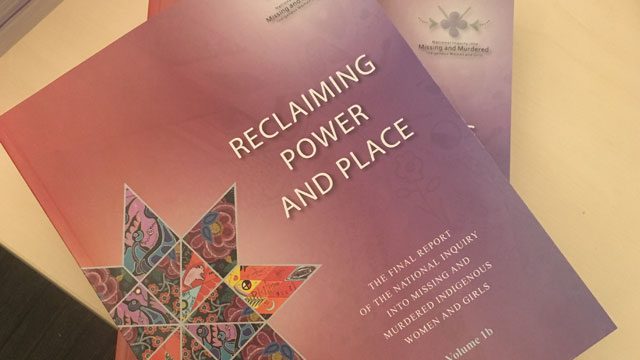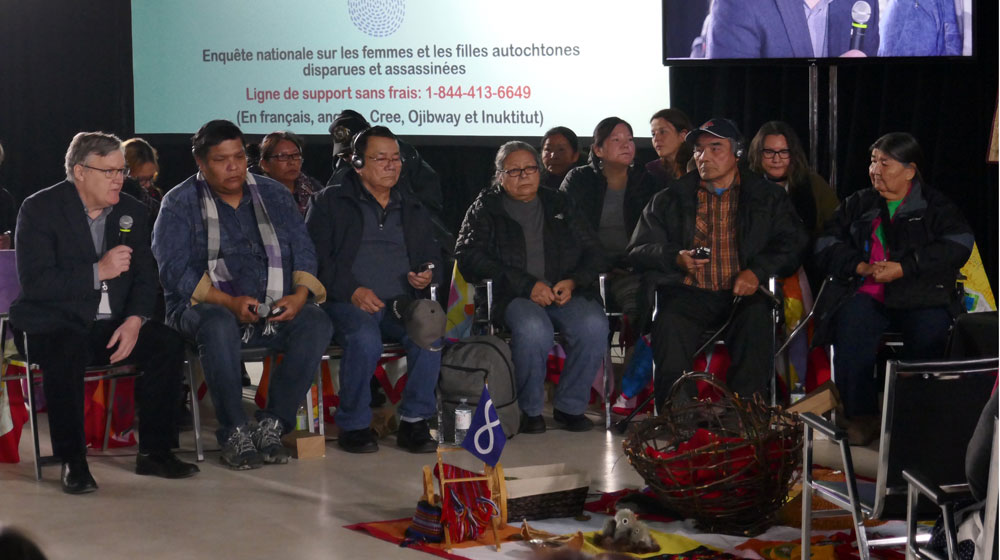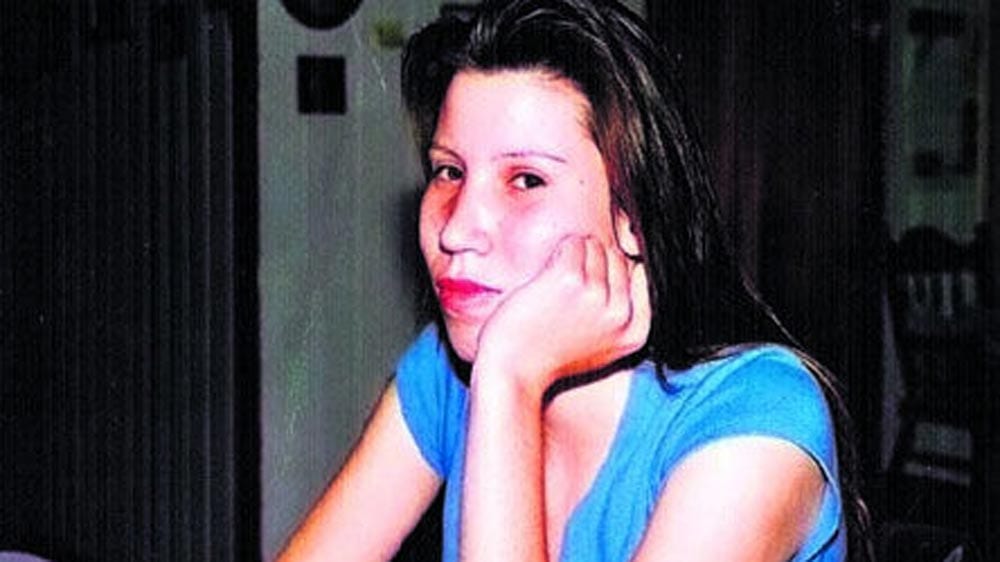
The final report of the National Inquiry into Missing and Murdered Indigenous Women and Girls proclaims a genocide, calls Canadians racist and apathetic, and demands change.
“For many non-Indigenous people, it’s important to be ready to ‘unlearn’ some learned behaviours,” said Marion Buller, chief commissioner of the inquiry in the foreword of Reclaiming Power and Place.
It concludes the disproportionate level of violence faced by Indigenous women and girls is “caused by state actions and in actions rooted in colonialism and colonial ideologies.”
The report, with 231 recommendations or “calls for justice”, is to be accepted Monday morning by Prime Minister Justin Trudeau at the same place it was first announced – the Canadian Museum of History in Gatineau, Que., directly across the Ottawa River from Parliament Hill.
The closing ceremony signals the end of two and a half years of public hearings – marked by delays and controversy – into the root causes of violence that persistently target Indigenous women and girls.
And makes good on a Trudeau election promise.
But the four commissioners want more: they insist the government enact their recommendations and call for a high-profile person to provide oversight.
They said in a release, this “will inspire all Nations and Canadians to unite and build a safer Canada for Indigenous women.”
A summary of the report released Friday said 2,300 witnesses provided more than 1,000 hours of testimony at 24 hearings.
The budget was $92 million.
But the commissioners call it “a Canadian genocide” because of how Indigenous women say they have been and continue to be viewed via myth, stereotype and the media: “Hyper-sexualization has created a perception that they’re always sexually available, which causes people to dismiss violence against them.”
That blame-the-victim attitude infects most services they come in contact with, the report says, including policing, child welfare and the justice system.
They inquiry admits it was unable to quantify the number of missing and murdered, which police put around 1,200 and advocates say is as high as 4,000.
However, to help find out, the report calls for reform in policing.
Not only should money be spent to bring Indigenous police services up to par and improve sexual assault investigations, but existing police work needs to be reviewed by a newly formed and transparent unit.
Present officers should receive cultural training and poverty awareness, the report suggests, and more Indigenous officers should be hired.“
Police recruits should go through a screening process for bias against different cultures,” the summary added.
The report is divided into three main sections: Establishing A New Framework, Encountering Oppression, and Healing Families, Communities and Nations.
On that last point, it calls for an immediate end to birth alerts – the controversial practice of child welfare workers seizing newborns from troubled mothers.
The Trudeau government has been working to make child welfare more family friendly but, as yet, hasn’t tackled birth alerts.
Meanwhile, the inquiry also released a Quebec-specific report because “the reality of violence against Indigenous women in Quebec is often overlooked.”
No sector was overlooked.
The report has advice for the federal government, the provinces and territories, as well as industries, institutions, services and partnerships.
It also calls on all Canadians to help stamp out racism and sexism – not only against females – but 2SLGBTQQIA people.
“Decolonize by learning the true history of Canada and Indigenous history in your local area,” it says. “Develop knowledge and read the final report.
“Using what you have learned…become a strong ally…actively working to break down barriers and to support others in every relationship and encounter in which you participate.”
APTN News will have coverage of the final ceremony on its Facebook page.
In Quebec, inquiry recommendations call for changes  (Pakuashipi community members testifying at the National MMIWG Inquiry hearing on November 29, 2017)
(Pakuashipi community members testifying at the National MMIWG Inquiry hearing on November 29, 2017)
In additional to its final report, the National Inquiry into Missing and Murdered Indigenous Women and Girls (MMIWG) has also released Quebec specific report.
The inquiry says a separate report for Quebec was necessary because at a national level “The reality of violence against Indigenous women in Quebec is often overlooked” and “Quebec’s political and socio-historical context is different from the Canadian context.”
The inquiry issued 21 “calls for justice” to Quebec institutions, government, and society as a whole.While some are shared with Canada, other calls are Quebec centric, including:
- The creation of an independent, civilian body to oversee the investigations of any conflicts that arise with Indigenous people and public services.
- Establish a crisis team for cases of missing Indigenous women and girls, including members of the 2SLGBTQQIA (Two spirit, Lesbian, Gay, Bisexual, Transgender, Queer, Questioning, Intersex, and Asexual) community.
- Mandatory training created with Indigenous organizations on the realities of Indigenous Peoples.
- Victim services in all Indigenous communities and in urban areas.
- Provide Indigenous families with all information regarding children who have been apprehended following admission to any health centre.
Many of the other recommendations concern Quebec police and justice institutions, they include:
- Appoint Indigenous representatives to the Quebec National Police School and the Independent Investigation Bureau to train all active police officers and police cadets on the socio-cultural realities of Indigenous people.
- Hold specialized English training sessions at the Quebec National Police School every year and offer specialized training on investigating to Indigenous police forces.
- Allow Indigenous communities in Quebec to elect an independent liaison officer tasked with supporting community members when their rights have been violated.
 (Tiffany Morrison went missing June 18, 2006.)
(Tiffany Morrison went missing June 18, 2006.)
In a foreward written for the Quebec report, Mohawk, Mi’gmaq woman Melanie Morrison describes how police did not take her sister Tiffany’s disappearance seriously until the trail went cold.
Her remains were found nearly four years later less than a kilometre from her home in Kahnawà:ke Mohawk Territory.
“I hope that there is an immediate change in the way the police manage cases involving Indigenous people, both on and off the reserves, so that nothing delays the searches for missing or murdered people. Based on my own experience, there was an obvious disconnect,” wrote Morrison.
Read More:
12 years after Tiffany Morrison vanished, change has come to how police handle missing person cases
The final call for justice in the Quebec report demands the Quebec government establish an inquiry on children taken from Indigenous families in Quebec.
During the November 2017 National MMIWG hearings in Mani-Utenam First Nation, it emerged that in the early 1970s, eight children from Pakuashipi, an Innu community on Quebec’s North Shore, disappeared after being admitted to the hospital in the nearby community of Blanc-Sablon.
Agnes Poker testified that two of her children never came back from Blanc Sablon.
“I would like to know where my two children are laid to rest,” said Poker in November 2017. “Every time I go to Blanc Sablon I go to the cemetery to try to find my children.”
The 168 page Quebec report is divided into five chapters that also provide a socio-historical context for First Nations and Inuit in Quebec, as well as parts of testimonies that were delivered by survivors and families from the province.As it’s done for the rest of Canada, the National MMIWG Inquiry has also called on Quebec to put into place an action plan the implement the calls as well as create an independent body to oversee their progress.










